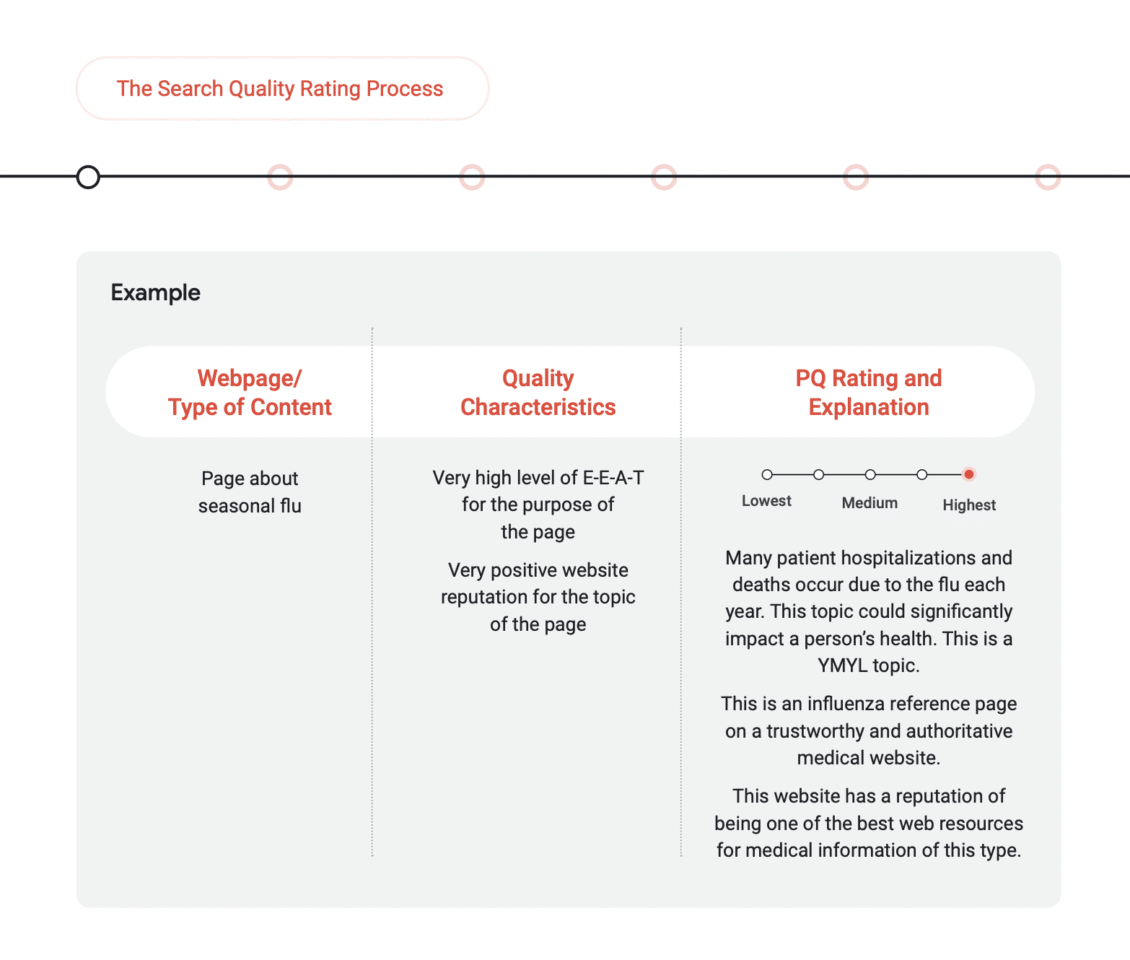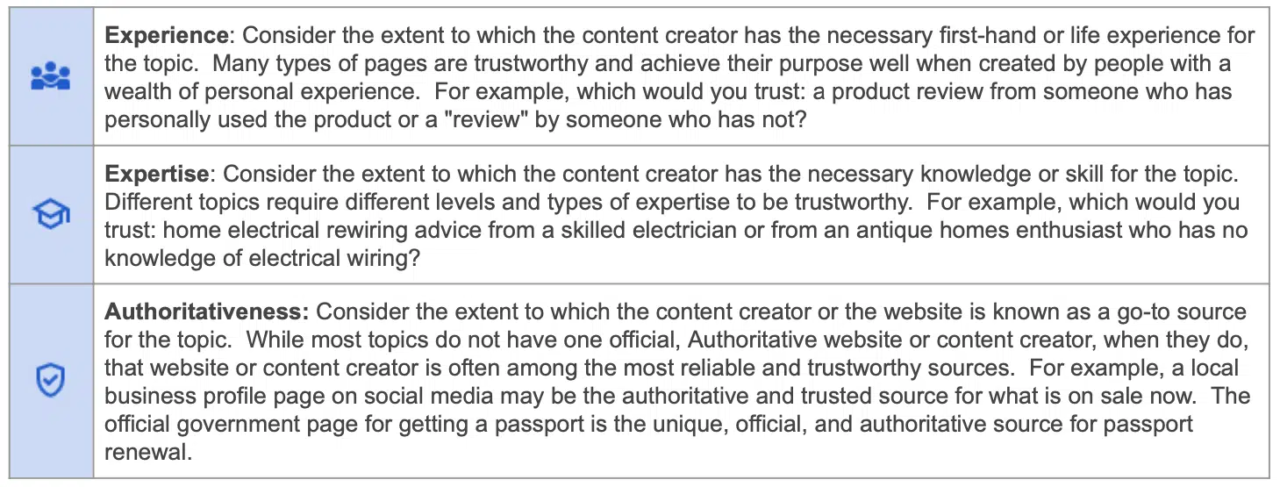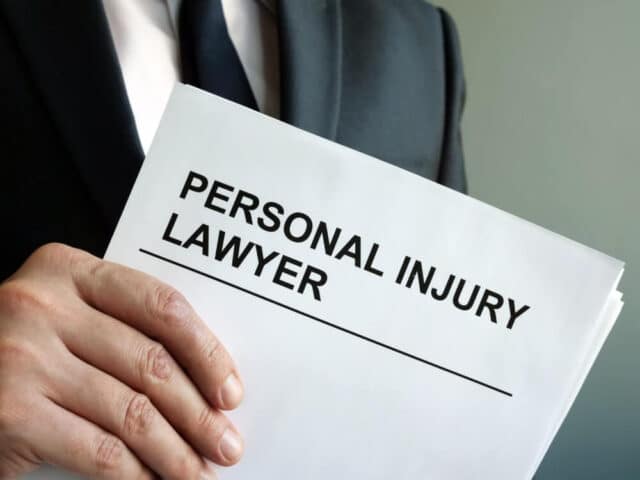
How to Improve E-E-A-T and YMYL: A Lawyer’s Guide
In the latest update to the quality rater guidelines, Google introduced an additional E to the E-A-T acronym, which stands for “Experience”. Let’s look at how to leverage E-E-A-T to improve your law firm’s SEO and get it rank higher in Google.
E-E-A-T’s Association With YMYL

To understand the importance of E-E-A-T, you have to understand the concept of YMYL (Your Money or Your Life).
As per the search quality guidelines, YMYL topics “have a high risk of harm because content about these topics could significantly impact the health, financial stability, or safety of people, or the welfare or well-being of society.”
Either the topic itself is harmful or dangerous (criminal acts, self-harm, violent extremism) or the topic could cause harm if the content is not accurate or trustworthy (symptoms of a heart attack, how to invest money, who can vote).
- YMYL Health or Safety: Topics that could harm mental, physical, and emotional health, or any form of safety such as physical safety or safety online.
- YMYL Financial Security: Topics that could damage a person’s ability to support themselves and their families.
- YMYL Society: Topics that could negatively impact groups of people, issues of public interest, trust in public institutions, etc.
- YMYL Other: Topics that could hurt people or negatively impact welfare or well-being of society.
If you prefer a video breakdown of E-E-A-T, below is a podcast episode where I discuss the subject with On The Map Marketing CEO, Kristaps Brencans. I audit specific law firm websites for E-E-A-T as well:
E-E-A-T: Breaking Down Each of Its Attributes
One of the critical parts of analyzing the quality of a certain piece of content is to identify who is responsible for the content and why they are posting it in the first place (showcasing talents, experiences, or perspectives; being appreciated; protect copyrighted material; be known by a higher number of people for financial purposes; feel comfortable buying products or hiring services).
Let’s look at each element of the E-E-A-T quality signal.

- Trust: “the extent to which the page is accurate, honest, safe, and reliable”. This means: online stores having secure online payment and reliable customer service; product reviews having genuine information about the product, not only for the sole purpose of selling; informational pages on YMYL topics being reliable and up-to-date.
- Experience: “the extent to which the content creator has the necessary first-hand or life experience for the topic”. This means: product reviews by someone who actually used the product; tips on sleeping positions while pregnant from recent moms; advice on the most practical type of wardrobe by people who recently furnished their homes.
- Expertise: “the extent to which the content creator has the necessary knowledge or skill for the topic”. This means: getting electrical rewiring advice from a skilled electrician (rather than someone who got their house rewired DIY-style); getting legal advice from an attorney (rather than someone else who went through a similar experience).
- Authoritativeness: “the extent to which the content creator or the website is known as a go-to source for the topic”. This means: getting information about a specific product on the official brand website; knowing how to get a passport from the government website;
Experience means that the person who wrote the content has first-hand experience regarding the topic they’re writing about. If a product, the writer used it. If a place, the writer visited it. If a situation, the writer lived through it.
Expertise means that the person who wrote the content has the necessary qualifications and technical knowledge for providing advice around the subject they’re writing about.
Trust: The Most Important Member of The E-E-A-T Family
According to the document, “trust is the most important member of the E-E-A-T family because untrustworthy pages have low E-E-A-T no matter how Experienced, Expert, or Authoritative they may seem.” This means that Expertise, Experience, and Authoritativeness contribute to increasing the Trust of a specific page and a website as a whole.
These are Google’s guidelines for evaluating Trust, along with real-life examples that can be applied to our clients’ websites:
- What the website says about itself on its About Page or other profile pages. This means we need to put effort into creating About Pages that actually describe the trajectory and qualifications of our clients. For example, a lawyer profile page should contain the bio, education history, work experience, and other information about the professional path of the attorney. A law firm’s About page should elaborate on the history of the company, as well as milestones (like prominent cases) and other important occasions that took place ever since its foundation.
- What others say about the website or its content creators (third-party reviews or references). This is yet another sign that off-page SEO is utterly important. We need to consider the quality of the backlinks that we are building and their relevance to the content of the main website. Citations could also play a big part here, meaning that we always need to make sure that our client is present on major directories (general or niche-specific) and that the information is consistent across all of these channels. We must also ask the client to encourage their customers to interact with these pages and add positive reviews.
- What is visible on the page – actual evidence on the page that the content creator can be trusted (e.g., real evidence of them doing the thing they claim to be an expert in). In our content, we need to provide as much evidence that the client is qualified in their practice area and has been making solid effort towards professional development. For law firm clients, this could mean providing the work history of the attorneys, having pages dedicated to case results, and adding badges from memberships, awards, and other recognitions. For service providers or contractors, the best thing you could do is add a portfolio with past examples of the client’s work, as well as badges for qualifications and licensing numbers, if applicable. Client testimonials also work for all sectors.
Experience: A “Sister” Concept to Expertise
Experience is introduced as a “sister” concept to Expertise, given that the latter’s application is more focused on YMYL topics.
Experience relates to first-hand involvement, meaning that anyone can have experience at something that they have encountered during their lives, even if they did not study the theoretical or formal aspects of it.
That being said, situations that rely on Experience do not have the potential to deeply harm or affect a user’s “health, financial stability, or safety, as well as the welfare or well-being of society”. When it comes to OTM clients, this would include:
- Service providers like party rentals and pressure cleaning
- Car rentals
- Packaging suppliers
- Online stores
- Interior designers
On the other hand, Expertise is needed for topics with a bigger potential to deeply affect the past-mentioned aspects of someone’s life. When it comes to OTM clients, this would include:
- Law firms
- Construction companies
- Medical and dental offices
- HVAC contractors
Below is Google’s take on what Experience and Expertise is needed for YMYL topics. This demonstrates how different aspects regarding the same topic can require different criteria for establishing Trust:
To define whether a webpage presents YMYL content and what kind of Experience or Expertise is expected, Google also provided guidelines on considering the type of website:
- If the website is a hobbyist site or corporate.
- If the website involves financial transactions or requires payments
- If the website is supported by volunteers or by professionals.
Needless to say that nearly all of the websites that we manage at OTM are corporate websites that involve financial transactions and are supported by professionals. Meaning, that they are held to higher standards than others.
Final Thoughts
E-E-A-T is important to your attorney website’s SEO in 2024. Hope the breakdown in this article helps you get started and work on improving your E-E-A-T. If you prefer to have a results-driven lawyer SEO agency work on your campaign and drive results for you, then contact us for a free audit.
Table of Contents
Related Articles
Dominate Your Market with Digital Marketing Services That Deliver
Talk to a certified professional today, and we will design a strategy specific to your case.






